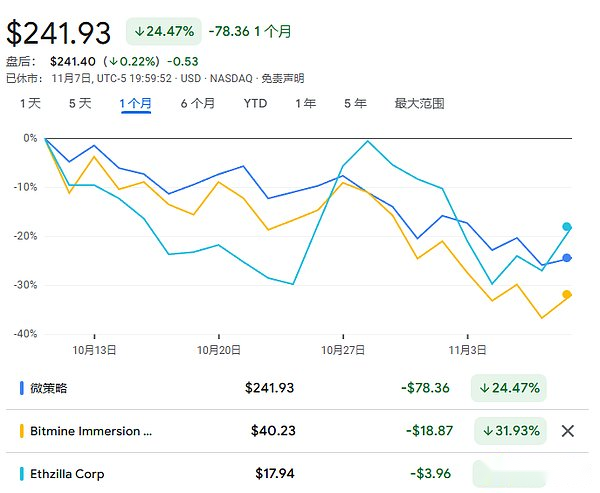
Zhao Ying, Wall Street Insights
A cryptocurrency sell-off that began in October is engulfing Wall Street’s hottest investment strategy this year.”Digital currency treasury companies” that buy cryptocurrencies such as Bitcoin and Ethereum through borrowing debt or raising funds were once regarded by investors as an excellent tool to leverage cryptocurrencies. Today, their stock prices have fallen far more than the tokens they hold.
This model was pioneered by Michael Saylor in 2020, transforming a small software company called MicroStrategy into a Bitcoin whale.The company’s market value hit a peak of about US$128 billion in July last year, but has now shrunk to about US$70 billion.MicroStrategy shares have fallen 25% in the past month, while Bitcoin has fallen 15% over the same period.
This round of plunge affected many heavyweight investors including well-known venture capitalist Peter Thiel.BitMine Immersion Technologies, the Ethereum treasury company backed by Thiel, has fallen by more than 30% in the past month, and ETHZilla, another biotech company invested by him, has fallen by 23% in the same period.

The total market value of cryptocurrency has plummeted by about 20% from the historical high of nearly $4.4 trillion hit on October 6, almost wiping out all the gains in the first ten months of this year. The year-to-date increase is only 2.5%, which is about 18% lower than the record high of $120,000 set on October 6.
The logic of premium trading of treasury companies is questioned
The core problem with digital currency treasury companies is that investors are effectively paying a premium for companies that hold cryptocurrencies well above their net asset value.Spectra Markets President Brent Donnelly said bluntly: “This whole concept makes no sense to me. You are just buying a $1 bill with $2. Eventually these premiums will be compressed.”
This doubt is not groundless.Jim Chanos, a well-known short seller on Wall Street, has been shorting MicroStrategy while buying Bitcoin, believing that investors have no reason to pay a premium for Saylor’s company.
On Friday, he told clients it was time to close the trade.He said in an interview on Sunday that although treasury company stocks are still overvalued, the premium level is no longer extreme and “this trading logic has basically been realized.”.
When digital currency treasury companies first emerged, they provided a channel for institutional investors who had previously struggled to directly invest in cryptocurrencies.But cryptocurrency exchange-traded funds launched over the past two years have been able to offer the same solution, undercutting treasury companies’ unique value proposition.
Leverage amplifies downside risks
“Digital asset treasury companies are essentially cryptoassets that are leveraged, so when cryptocurrencies fall, they fall even more,” said Matthew Tuttle.The MSTU ETF he manages, which aims to provide double the returns of MicroStrategy, has plunged 50% in the past month.
This leverage effect is vividly reflected in many treasury companies.Tuttle also emphasized, “Bitcoin has proven that it will not disappear, and buying on dips will pay off.”
Matt Cole, CEO of Bitcoin treasury company Strive, said the average price at which the company raised funds to buy Bitcoin earlier this year was more than 10% higher than current levels.Strive shares have fallen 28% in the past month.Cole said many treasury companies are “in trouble” because companies facing losses have difficulty selling new shares to buy more cryptocurrencies, which could put pressure on cryptocurrency prices and raise questions about the companies’ business models.
However, Cole said Strive is well-positioned to “weather the volatility” because it recently raised capital through preferred stock rather than debt.
Believers are still holding on
Despite the setback, some investors are still adding to their positions.Cole Grinde, a 29-year-old investor in Seattle, bought about $100,000 of BitMine stock at about $45 when he started hoarding Ethereum earlier this year and has now lost about $10,000.But the beverage industry salesman said he was adding to his holdings and selling BitMine options to help offset losses.
Grinde attributes his confidence in the company to the growing popularity of the Ethereum blockchain, as well as Tom Lee’s influence.Lee worked at JPMorgan Chase for 15 years and is currently a managing partner at Fundstrat Global Advisors and a frequent guest on business television shows.”I think his network and charisma helped the stock price soar after he took over,” Grinde said.
Saylor himself has maintained his usual optimistic attitude, claiming on social media that Bitcoin is on “discount promotion.”






